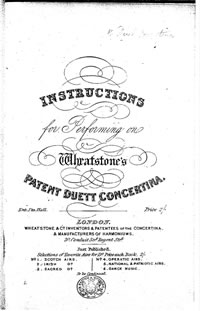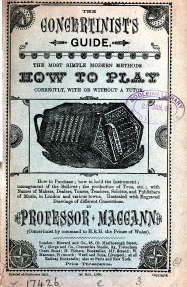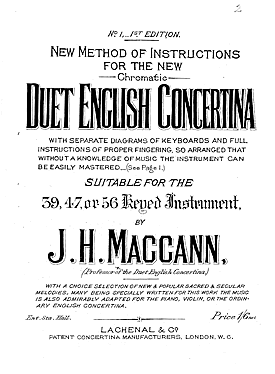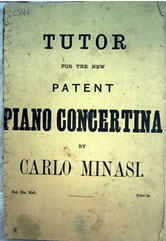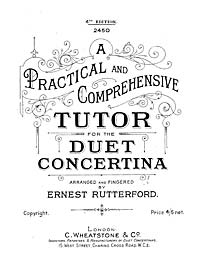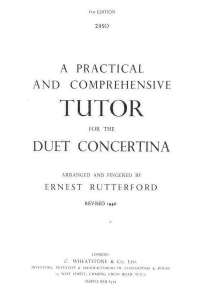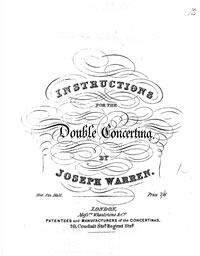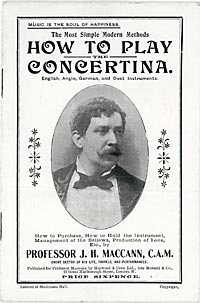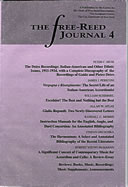Posted 01 April 2003
Instruction Manuals for the English, Anglo, and Duet Concertina:
An Annotated Bibliography
Randall C. Merris
Part III. Duet Concertina
D1
Although the concertina system is widely known as “McCann,” or “MacCann,”
the inventor’s own spelling of his surname is Maccann
(see D3).
D2
Instructions for Performing on Wheatstone’s Patent Duett Concertina.
London: Wheatstone & Co., 1855.
BL
D3
Maccann, John Hill.
The Concertinist’s Guide: The Most Simple Modern Methods, How to
Play Correctly, With or Without a Master.
London: Howard & Co., 1888.
BL
Maccann, inventor of the popular duet system that he patented (“Improvements in Concertinas,” March 12, 1884; Patent No.
4752), was billed as “Concertinist by command to H. R. H. the Prince of Wales.” He played and promoted the Maccann
duet concertinas built by Lachenal & Co. The Guide
contains advertisements and listings of many concertina makers,
dealers, tuners, repairers, and teachers (including Signor Alsepti, Richard Blagrove, John H. Maccann, Madame Sydney
Pratten, Charles Roylance, George Roe, and Clementine Ward). William H. Maccann, John Hill’s brother, is listed as a
maker, dealer, and Maccann duet teacher in Plymouth.
D4
———.
New Method of Instructions for the New Chromatic Duet English Concertina.
London: Lachenal & Co., 1885.
BL, HM
D5
Minasi, Carlo.
Tutor for the New Patent Piano Concertina.
London, Carlo Minasi, c. 1863.
HM
The piano concertina is described in the tutor as “having double action, produces the same note by compression or
expansion of the bellows; natural succession as in the Pianoforte.
High tones on the right, and the lower for the left.”
Dating of the tutor is based on the fact that “new patent piano concertina” in the title
refers to the system in Charles F. W. Rust (“Concertinas, &c.,” July 9, 1862; Patent No. 1976).
D6
Rutterford, Ernest.
A Practical and Comprehensive Tutor for the Duet Concertina:
Wheatstone’s Instructions for the Duet Concertina.
London: Wheatstone & Co., 1914 (and four later editions through the revised edition of 1946).
BL, HM
Rutterford, one of the earliest concertina recording artists,
made at least a dozen commercial discs and cylinders; see
Malcolm Clapp, “Concertinas on 78's,”
Concertina Magazine 8 (Autumn 1984): 14. He presumably was related
(son or nephew?) to Charles Rutterford, who performed on English concertina at concerts
organized by Richard Manning Blagrove
(see E5).
D7
The Salvation Army Tutor for the Triumph Concertina.
London: Salvationist Publishing and Supplies, 1924
(HM); new ed., rev. and enlarged, 1938 (BL).
The “Triumph” was a Crane duet system that was made for the Salvation Army,
which introduced it in 1912.
D8
Warren, Joseph.
Instructions for the Double Concertina.
London: Wheatstone & Co., 1855.
BL
“Double concertina” was Charles Wheatstone’s name for an early type of duet concertina;
see Atlas, The Wheatstone English Concertina, 12;
and Wayne, Concertina Book, 36.
D9
Wilton-Bulstrode, H.
Crane’s Patent English Combination Concertina Tutor.
Liverpool: Crane & Sons, c. 1898.
OSS
The Crane duet patent (“Improvements in English Concertinas,” September 28, 1896; Patent No. 21,730)
was granted to John Butterworth, a pianoforte tuner from Cheshire; see Phil Inglis,
“The History of the Duet Concertina: Part III,”
Concertina Magazine 14 (Spring 1986): 11-12.
Added subsequent to original publication:
D10
Maccann, John Hill.
How to Play the Concertina.
London: Hopwood & Crew, (by 1902).
OSS
A booklet recently discovered in the National Archives of Australia.
The text includes material from the how-to-play section of Maccann’s
The Concertinist’s Guide
( D3),
as well as an interview with Professor Maccann.
D11
Warren, Joseph.
Progressive Exercises in the Key of C.
London: Wheatstone & Co., c. 1850.
OSS
For the early Wheatstone “Double” duet concertina
(see D8).
Have feedback on this article?
Send it to the author.
Reprinted from the Concertina Library
http://www.concertina.com
© Copyright 2000– by Randall C. Merris
|

Signor Alsepti's Tutor
for English Concertina
Lachenal, c. 1895
Contents
The original version of this article appeared in The Free-Reed Journal, Vol. 4 (2002), pp. 85-118.
© 2002 Randall C. Merris.
Links to related documents
-
 How to Play Chords on Any Maccann Duet Concertina
How to Play Chords on Any Maccann Duet Concertina
-
by Robert Gaskins
-
Explains how to play chords to accompany songs on Maccann Duet
concertinas of any size and from any period. Intended for beginners,
assumes no knowledge of musical notation or theory.
Includes a chord chart suitable for the lid of a concertina case. 51 pages.
-
Posted 15 February 2001
-
» read full article in pdf
-
 New Method of Instructions for the New Chromatic Duet English Concertina ... &c.
New Method of Instructions for the New Chromatic Duet English Concertina ... &c.
-
by John Hill Maccann
-
Maccann’s own tutor, first
published 1885 by Lachenal. Cover reads in part: "New Method
of Instructions for the New Chromatic Duet English Concertina,
with separate diagrams of keyboards and full instructions of
proper fingering, so arranged that without a knowledge of music
the instrument can be easily mastered ... Suitable for the 39,
47, or 56 Keyed Instrument. By J. H. Maccann, (Professor of the
Duet English Concertina)." First edition, London: Lachenal & Co., 1885. 43 pages.
Trim size 10 inches by 13 inches.
Updated 01 July 2003: Fourth edition (date unknown),
the cover of which reads in part "Suitable for the 39,
46 or 55 Keyed Instrument." 4th Edition. 43 pages.
This copy was provided by Bradley Strauchen, Deputy Keeper of Musical Instruments
at the Horniman Museum.
-
Posted 15 February 2003; last updated 01 July 2003
-
» (1st ed.) read full document in pdf
-
» (4th ed.) read full document in pdf
-
 The Concertinist's Guide
The Concertinist's Guide
-
by John Hill Maccann
-
The Most Simple Modern Methods; How to Play
Correctly, With or Without a Tutor
8vo. London: Howard & Co., 1888.
Images from a microfilm of a copy at the Bodleian Library, replacing
a British Library copy destroyed in World War II. (Former British Library
shelfmark D-7808.c.14.(14.), replaced by British Library microfilm
Mic.A. 10532(4), Bodleian Shelfmark 17426 e 3(2).) Also a full
transcription which is searchable in the Adobe PDF reader. 50 pages.
-
Posted 15 November 2001
-
» read full document in pdf
-
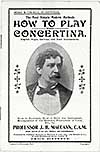 How to Play the Concertina
How to Play the Concertina
- by John Hill Maccann
-
A newly-discovered booklet, reliably dated to 1902.
The text of the document consists of two parts: (1) a
part of the "how to play" text from Maccann's earlier
publication The Concertinist's Guide (1888); and (2) an
interview with Professor Maccann reprinted from The Era
theatrical newspaper of London, issue of 25 January 1902.
In addition to the text,
the booklet contains some new photographs of Maccann,
including the first known photographs of him playing the concertina.
There is a sample program of a recital by Maccann, a list of phonograph
records for sale recorded by Maccann, and a catalogue of
some of Maccann's published music compositions.
This copy was discovered in the National Archives of
Australia, where it had been deposited for copyright registration.
- Posted 27 September 2004
-
» read article and full document
-
» read full document in pdf (medium quality)
-
» read full document in pdf (higher quality)
-
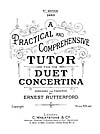 A Practical and Comprehensive Tutor for the Duet Concertina
A Practical and Comprehensive Tutor for the Duet Concertina
-
by Ernest Rutterford
-
The tutor for the Maccann Duet concertina which was published and sold
by Wheatstone over a very long period. It does not contain the name "Maccann,"
but refers only to the Wheatstone Duet.
(Wheatstone's Instructions for the Duet Concertina.) 4th ed.
London: undated (1930's?). From an original owned by Chris Algar. 56 pages.
-
Posted 15 November 2001
-
» read full article in pdf
-
 Maccann Duet Chords Tutor Manuscript
Maccann Duet Chords Tutor Manuscript
-
from Robert Gaskins
-
A polished 76-page manuscript “chords tutor” found in the
case of a matching 57-key Maccann Duet made by C. Jeffries Maker, 23 Praed St.
The instrument and the tutor are dated c. 1915. This may have been a “semi-bespoke”
tutor included with the instrument when it was originally sold.
Unlike the much later Jeffries System manuscript tutor (c. 1960) written with a biro
(ballpoint pen) in very rough style, this much-longer document was written with a split pen and
is very carefully finished.
-
Posted 15 February 2003
-
» read full document in pdf
-
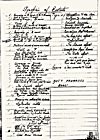 Stanley Manuscript Maccann Duet Tutor
Stanley Manuscript Maccann Duet Tutor
-
by Henry Stanley
-
One of a number of similar manuscript tutors for the Maccann Duet
Concertina written by Henry Stanley for his private pupils. Exercises,
scales, chords, tunes of graduated difficulty, tips on technique.
Hand written on music paper, 41 pages. This copy
belongs to Richard Evans.
-
Posted 15 May 2003
-
» read full document in pdf
-
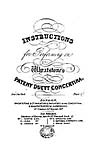 Instructions for Performing on Wheatstone's Patent Duett Concertina
Instructions for Performing on Wheatstone's Patent Duett Concertina
-
by Anonymous (C. Wheatstone & Co.)
-
From page 2: "Many persons having formed opinions very prejudicial
to the Concertina, in consequence of mistaking for the original, an
imitation called the German Concertina, the public is informed
that, the so called instrument is totally different (with the exception
of the exterior) ... ."
Published by Wheatstone & Co., deposited at the
British Museum 28 July 1855. 21 pages. Trim size 6.5 inches by 10 inches.
-
Posted 15 February 2003
-
» read full document in pdf
-
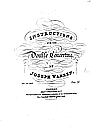 Instructions for the Double Concertina
Instructions for the Double Concertina
-
by Joseph Warren (C. Wheatstone & Co.)
-
A complete tutor for the Double duet, with an introduction devoted to the theory
of the keyboard arrangement and the leveraging of patterns among key signatures.
Published by Wheatstone & Co., deposited at the British Museum
28 July 1855. 27 pages. Printed in large format, trim size 9.5 inches by 14 inches.
-
Posted 15 February 2003
-
» read full document in pdf
-
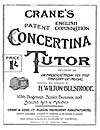 Crane's Patent English Combination Concertina Tutor
Crane's Patent English Combination Concertina Tutor
-
by H. Wilston-Bulstrode
-
The earliest tutor for Crane-system duets, published for
Crane's of Liverpool. Contains key diagrams for
instruments from 35 keys to 55 keys, theory, exercises, and
a number of tunes.
Published by Lachenal & Co., c. 1896. 54 pages.
From the introduction: “Crane's Patent English Combination
Concertina has already won for itself a name among the best-known
masters of the instrument. Its capacity of execution, sweetness of
tone and adaptability for Harmonic combinations, taken with the
striking ease with which it may be learnt, even by the least
gifted musicians, must in due time cause it to be generally
regarded as the leading Concertina in the market, a position
which Messrs Crane & Sons Ltd. unhesitatingly claim for it.”
-
Posted 15 February 2003
-
» read full document in pdf
-
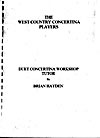 All-Systems Duet Workshop Tutor
All-Systems Duet Workshop Tutor
-
by Brian Hayden
-
Tutor for a workshop on how to play duet concertinas of all systems. Begins
with notation, fingering, and chords for Maccann Duets, Jeffries Duets, Crane (Triumph)
Duets, and Hayden Duets. Tunes of progressive difficulty, with increasing
number of notes and then in keys with increasing numbers of accidentals, all
written in notation based on the treble clef. Notes
on chord patterns and on strategies for melody and accompaniment applicable to
all systems of duet concertina.
Presented to The West Country Concertina Players, 1994. 20 pages.
-
Posted 15 August 2003
-
» read full document in pdf
-
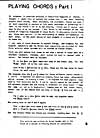 Playing Chords [for English, Anglo, and Maccann Duet]
Playing Chords [for English, Anglo, and Maccann Duet]
-
by Brian Hayden
-
"I would like to explain the system that I use when teaching
players about chords, their structure, and placement. Chords are
what I am most requested to explain at folk music workshops or
gatherings as I tend to use chords a lot in my own playing." (From
the introduction.)
Includes a novel notation for chords which is used elsewhere on this website.
As published in Concertina Magazine
(Australia) in three parts, 12-14 (1985), 12:5-7,
13:12-14, and 14:8-10; with corrections in 15-16 (1986), 15:14
and 16:1,6,9.
-
Posted 01 March 2004
-
» read full article in pdf
|



